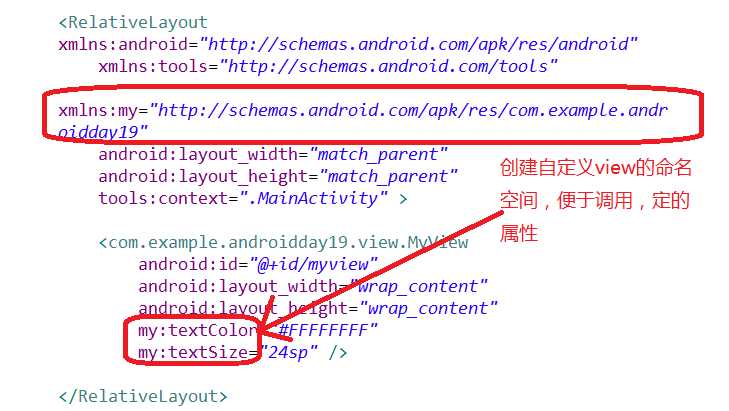标签:
自定义View:
第一步:创建一个View的实现类, 创建构造器和重写onDraw() 和onMesure()等方法。
TypedArray获取自定义View的属性的数组
context.obtainStyledAttributes(attrs, R.styleable.MyView);
// 从数组中根据styleable中定义的对应属性的值
属性是自定义View的名+“-”+属性名===》MyView_textColor
int textColor = array.getColor(R.styleable.MyView_textColor, 0XFF00FF00);
设置画笔的属性:mPaint.setColor(textColor);
/** * 这个是自定义的TextView. * 至少需要重载构造方法和onDraw方法 * 对于自定义的View如果没有自己独特的属性,可以直接在xml文件中使用就可以了 * 如果含有自己独特的属性,那么就需要在构造函数中获取属性文件attrs.xml中自定义属性的名称 * 并根据需要设定默认值,放在在xml文件中没有定义。 * 如果使用自定义属性,那么在应用xml文件中需要加上新的schemas, * 比如这里是xmlns:my="http://schemas.android.com/apk/res/demo.view.my" * 其中xmlns后的“my”是自定义的属性的前缀,res后的是我们自定义View所在的包 * @author Administrator * */ public class MyView extends View { Paint mPaint; //画笔,包含了画几何图形、文本等的样式和颜色信息 public MyView(Context context) { super(context); } public MyView(Context context, AttributeSet attrs){ super(context, attrs); mPaint = new Paint(); //TypedArray是一个用来存放由context.obtainStyledAttributes获得的属性的数组 //在使用完成后,一定要调用recycle方法 //属性的名称是styleable中的名称+“_”+属性名称 TypedArray array = context.obtainStyledAttributes(attrs, R.styleable.MyView); int textColor = array.getColor(R.styleable.MyView_textColor, 0XFF00FF00); //提供默认值 ,放置未指定 float textSize = array.getDimension(R.styleable.MyView_textSize, 36); mPaint.setColor(textColor); mPaint.setTextSize(textSize); array.recycle(); //一定要调用,否则这次的设定会对下次的使用造成影响 } public void onDraw(Canvas canvas){ super.onDraw(canvas); //Canvas中含有很多画图的接口,利用这些接口,我们可以画出我们想要的图形 //mPaint = new Paint(); //mPaint.setColor(Color.RED); mPaint.setStyle(Style.FILL); //设置填充 canvas.drawRect(10, 10, 100, 100, mPaint); //绘制矩形 mPaint.setColor(Color.BLUE); canvas.drawText("我是被画出来的", 10, 120, mPaint); } }
第二步:在/res/values/下创建一个attrs文件,添加<declare--styleable/>
<!-- 自定义属性 --> <declare-styleable name="MyView"> <attr name="textColor" format="color"/> <attr name="textSize" format="dimension"/> </declare-styleable>
第三步:在布局文件中添加命名空间,便于引用在attrs.xml文件中自定义的属性

标签:
原文地址:http://www.cnblogs.com/chengbao/p/5625248.html